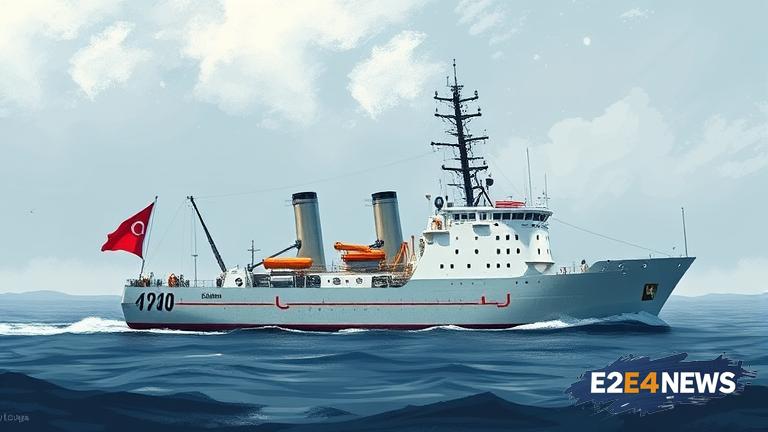The research vessel Falkor, a state-of-the-art ship equipped with cutting-edge technology, has been forced to abandon its expedition in Uruguay due to a technical failure. The vessel, which is owned and operated by the Schmidt Ocean Institute, was conducting a comprehensive survey of the Uruguayan coast when the incident occurred. According to reports, the technical failure was caused by a malfunction in the ship’s propulsion system, which rendered it unable to continue its mission. The crew and scientists on board were left with no choice but to halt the expedition and return to port for repairs. The Falkor is a 272-foot-long vessel that is equipped with advanced sonar and submersible vehicles, making it an ideal platform for conducting marine research. The expedition was focused on studying the marine ecosystems and habitats off the coast of Uruguay, with a particular emphasis on the country’s coral reefs and marine biodiversity. The research team had been collecting data and samples since the beginning of the expedition, but the technical failure has put a significant dent in their plans. The Schmidt Ocean Institute has announced that it will conduct a thorough investigation into the cause of the technical failure and will work to repair the vessel as soon as possible. The incident has highlighted the risks and challenges associated with conducting marine research, where technical failures can have significant consequences. Despite the setback, the scientific community remains committed to continuing the research and exploring the world’s oceans. The Falkor has been involved in numerous high-profile expeditions in the past, including a recent survey of the Mariana Trench, the deepest point in the ocean. The vessel is equipped with a range of advanced technologies, including autonomous underwater vehicles and remotely operated vehicles, which enable scientists to collect data and conduct research in even the most remote and inhospitable regions of the ocean. The Uruguayan expedition was an important part of the Falkor’s research program, which aims to advance our understanding of the world’s oceans and the impacts of climate change on marine ecosystems. The research team had been working closely with local scientists and researchers to study the marine ecosystems and habitats off the coast of Uruguay, and the data collected during the expedition would have provided valuable insights into the health and biodiversity of these ecosystems. The technical failure has also raised concerns about the reliability and maintenance of research vessels, which are critical to the success of marine research expeditions. The incident has sparked a debate about the need for more robust and reliable technologies, as well as better maintenance and repair procedures, to minimize the risk of technical failures and ensure the success of future expeditions. The Schmidt Ocean Institute has announced that it will conduct a thorough review of its maintenance and repair procedures to prevent similar incidents in the future. The incident has also highlighted the importance of international cooperation and collaboration in marine research, where scientists and researchers from different countries and institutions work together to advance our understanding of the world’s oceans. The Falkor’s expedition in Uruguay was a prime example of this collaboration, with scientists and researchers from Uruguay, the United States, and other countries working together to study the marine ecosystems and habitats off the coast of Uruguay. Despite the setback, the scientific community remains committed to continuing the research and exploring the world’s oceans, and the Falkor is expected to resume its expedition as soon as the technical issues are resolved.
